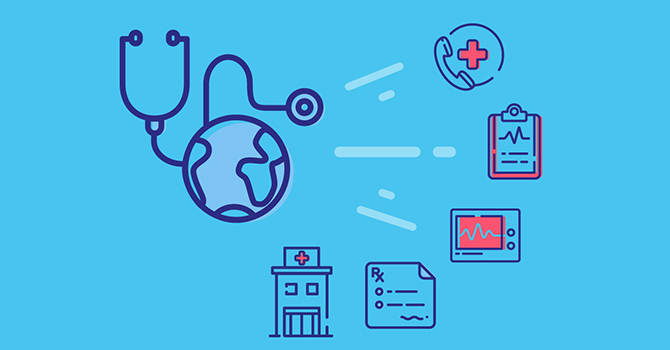Healthcare RCM Services for Efficient Income Cycle Administration
Healthcare RCM Services for Efficient Income Cycle Administration
Blog Article
Comprehending the Duty of Healthcare RCM in Enhancing Financial Efficiency and Person Contentment
Browsing the complexities of Health care Revenue Cycle Administration (RCM) is important for achieving ideal economic efficiency while at the same time raising patient fulfillment. As we discover the transformative potential of RCM, questions about its critical application and future improvements bid, promising understandings that might redefine sector standards and patient experiences alike.

Secret Elements of RCM
In the complicated landscape of health care, Revenue Cycle Administration (RCM) is essential in ensuring monetary security and operational efficiency. Individual registration and qualification verification are foundational actions, making sure that accurate person info is caught and insurance coverage is verified before solutions are made.

Fee capture is another vital component, including the accurate recording of solutions provided to clients. It guarantees that all billable solutions are represented, therefore taking full advantage of profits capacity. Concurrently, clinical coding translates patient experiences right into standardized codes, which are critical for invoicing and regulative compliance.
Cases submission and administration comply with, including the preparation and entry of insurance claims to payers. This procedure calls for thorough interest to detail to decrease mistakes and avoid hold-ups. Rejection administration is an aggressive approach to deal with and fix rejected cases, safeguarding profits streams.
Finally, settlement posting and person collections complete the cycle, guaranteeing settlements are properly recorded and superior balances are pursued. Together, these elements form a durable framework that supports the monetary and functional health and wellness of healthcare organizations.
Effect on Financial Efficiency
Effective Income Cycle Management (RCM) significantly affects a medical care company's economic performance by enhancing capital and decreasing earnings leakage. RCM encompasses the detailed payment and collection processes that ensure doctor successfully handle their monetary deals from individual registration to final repayment. By streamlining these processes, organizations can lessen rejected claims, quicken settlement cycles, and boost general monetary wellness.
Economic performance is improved through thorough administration of invoicing procedures, which entails accurate coding and prompt entry of insurance claims. This decreases the possibility of insurance claim denials and beings rejected, which can significantly hinder profits flow otherwise attended to without delay. Moreover, integrating sophisticated technology remedies helps with real-time tracking of insurance claims and economic metrics, offering healthcare managers with the devices necessary to make enlightened strategic decisions.

Enhancing Client Fulfillment
While optimizing monetary performance is a vital objective of Profits Cycle Administration (RCM), it also plays a pivotal duty in boosting patient satisfaction. By decreasing management concerns, RCM allows medical care carriers to concentrate a lot more on individual care, which directly boosts person satisfaction.

RCM likewise enhances individual complete satisfaction via efficient interaction. By preserving a thorough database of patient info, RCM facilitates enhanced communication in between patients and medical care suppliers, guaranteeing people feel educated and valued.
Techniques for Reliable RCM
Attaining effective Income Cycle Management (RCM) calls for health care organizations to apply a set of strategic practices that make sure monetary stability and functional performance. One crucial technique is the adoption of technology-driven solutions, such as incorporated software program platforms that streamline invoicing processes, reduce mistakes, and enhance data precision. These systems make it possible for real-time tracking of monetary metrics, enabling punctual recognition and their explanation rectification of ineffectiveness.
An additional approach is the standardization of processes throughout the earnings cycle. Healthcare RCM. This includes establishing constant policies for client registration, insurance policy verification, and declares processing. By making certain that all personnel follow these standards, companies can expedite and minimize discrepancies payment collections
Staff training and development additionally play a pivotal duty in reliable RCM. Trained workers other can effectively navigate complicated billing procedures and regulations, boosting and reducing rejections money circulation. Routine updates on policy modifications and finest methods assist maintain a skilled and knowledgeable labor force.
Future Trends in RCM
As healthcare companies improve their Revenue Cycle Monitoring (RCM) techniques with modern technology and standardized procedures, interest is currently turning in the direction of the future patterns forming this important area. One substantial trend is the assimilation of synthetic knowledge (AI) and artificial intelligence to automate complicated jobs, such as insurance claims processing and anticipating analytics. These technologies are expected to minimize errors, increase transaction times, and provide data-driven understandings for much better decision-making.
Additionally, the change towards value-based care proceeds to influence RCM practices - Healthcare RCM. Doctor are expected to significantly concentrate on patient end results and fulfillment, requiring RCM systems that can fit new repayment models. This shift will certainly require more thorough information collection and analysis to efficiently gauge and report on efficiency metrics
Interoperability is an additional emerging concern, as smooth data exchange between inconsonant systems ends up being crucial. Improved interoperability will certainly assist in more accurate patient information sharing, reducing management problems and enhancing the client experience.
Conclusion
Healthcare Earnings Cycle Administration (RCM) substantially influences both economic performance and patient complete satisfaction by optimizing payment processes, making certain exact coding, and enabling punctual claims entry. Effective RCM decreases profits leak and speeds up cash flow, reducing insurance claim denials Continued and accelerating payments.
Browsing the complexities of Medical care Profits Cycle Management (RCM) is crucial for accomplishing optimal economic performance while simultaneously raising client contentment. RCM incorporates the detailed billing and collection procedures that make certain medical care providers successfully manage their financial purchases from client enrollment to final settlement. By decreasing administrative burdens, RCM permits health care providers to concentrate much more on client treatment, which directly improves person fulfillment.
By preserving a comprehensive data source of client details, RCM assists in improved interaction in between individuals and healthcare carriers, making sure clients really feel informed and valued.Medical Care Revenue Cycle Monitoring (RCM) considerably affects both financial performance and individual satisfaction by enhancing invoicing procedures, making certain accurate coding, and allowing timely insurance claims entry.
Report this page